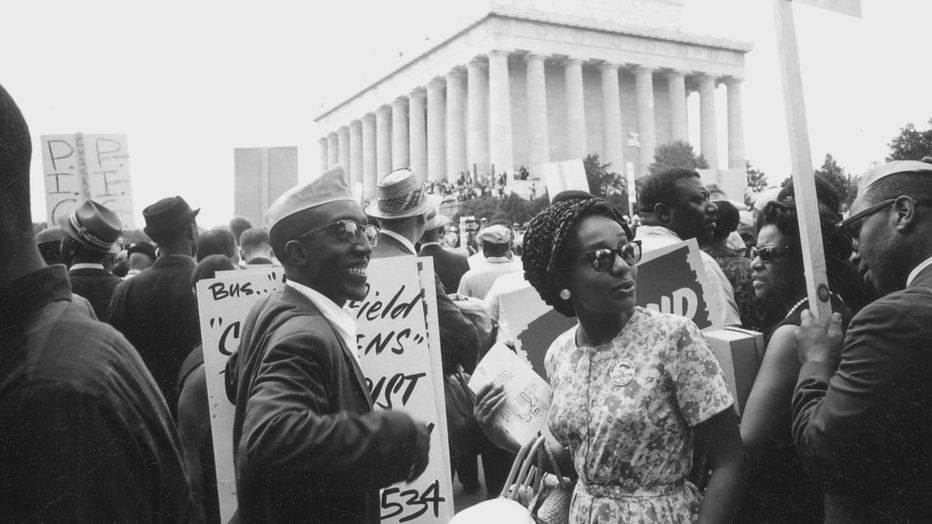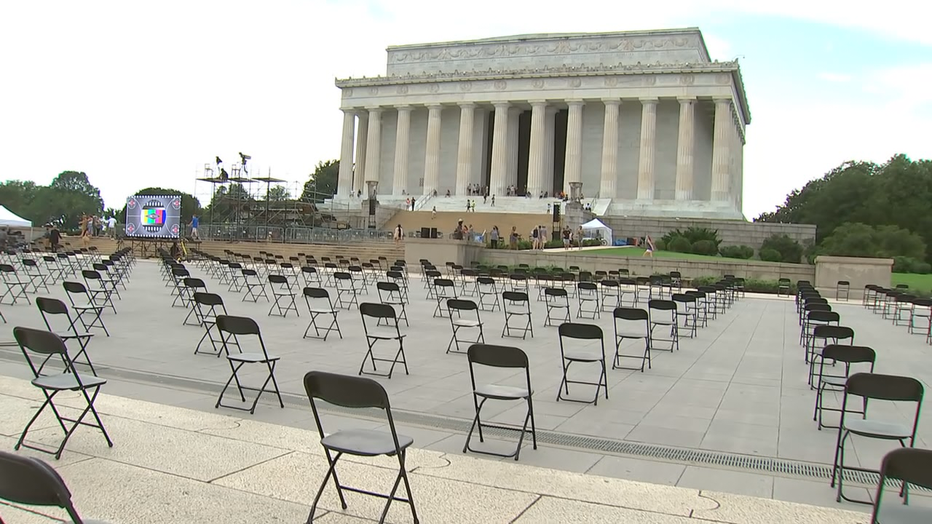Thousands expected at March on Washington commemorations
WASHINGTON - Capping a week of protests and outrage over the police shooting of a Black man in Wisconsin, civil rights advocates will highlight the scourge of police and vigilante violence against Black Americans at a commemoration of the 1963 March on Washington for Jobs and Freedom.
Thousands are expected at the steps of the Lincoln Memorial on Friday, where the Rev. Martin Luther King, Jr. delivered his historic "I Have A Dream" address, a vision of racial equality that remains elusive for millions of Americans.
And they are gathering on the heels of yet another shooting by a white police officer of a Black man -- this time, 29-year-old Jacob Blake in Kenosha, Wisconsin, last Sunday -- sparking days of protests and violence that left two dead.
"We've got to create a different consciousness and a different climate in our nation," said Martin Luther King III, a son of the late civil rights icon and co-convener of the march.
"That won't happen though, unless we are mobilized and galvanized," King said Thursday.
He and the Rev. Al Sharpton, whose civil rights organization, the National Action Network, planned Friday's event, said the objective of the march is to show the urgency for federal policing reforms, to decry racial violence, and to demand voting rights protections ahead of the November general election.
To underscore the urgency, Sharpton has assembled the families of an ever-expanding roll call of victims: George Floyd, Breonna Taylor, Rayshard Brooks, Ahmaud Arbery, Trayvon Martin, Eric Garner, Blake, among others.
Following the commemorative rally that will include remarks from civil rights attorney Ben Crump, who represents several of the victims' families, participants will march to the Martin Luther King, Jr. memorial in West Potomac Park, next to the National Mall, and then disperse.

Turnout in Washington will be lighter than initially intended due to city-imposed coronavirus pandemic restrictions that limit out-of-state visitors to the nation's capital. To that end, the National Action Network organized a handful of satellite march events in South Carolina, Florida and Nevada, among others.
While participants march in Washington, Sharpton has called for those in other states to march on their U.S. senators' offices and demand their support of federal policing reforms. Sharpton said protesters should also demand reinvigorated U.S. voter protections, in memory of the late Congressman John Lewis who, until his death on July 17, was the last living speaker at the original march.
In June, the Democrat-controlled House of Representatives passed the George Floyd Justice In Policing Act, which would ban police use of stranglehold maneuvers and end qualified immunity for officers, among other reforms. Floyd, a Black man, died May 25 after a white police officer in Minneapolis held a knee to the man's neck for nearly eight minutes, sparking weeks of sustained protests and unrest from coast to coast.
In July, following Lewis' death, Democratic senators reintroduced legislation that would restore a provision of the historic Voting Rights Act of 1965 gutted by the U.S. Supreme Court in 2013. The law previously required states with a history of voter suppression to seek federal clearance before changing voting regulations.
Both measures are awaiting action in the Republican-controlled Senate.

"We're demanding that that be enacted," King said. "The senators won't even take action on it. That gives us an opportunity to say, `OK, we gave you guys a chance, we as the people, as Black people, as white people, as Latinos and Hispanics and we're going to vote you out."'
He added: "There are a number of senators who need to go because they don't have the capacity or have not demonstrated they have a capacity to understand what needs to happen in the community."
Thursday evening, the NAACP began commemorating the March on Washington with a virtual event that featured remarks from voting rights activist Stacey Abrams and Speaker of the House Nancy Pelosi, and Academy Award-winning actor Mahershala Ali.
"Thanks to the activism of countless young people, the movement for justice goes on," Pelosi said. "We must keep up the fight and, as John Lewis would say, `find a way to get in the way."'
Later in the evening, the Movement for Black Lives, a coalition of more than 150 Black-led organizations that make up the broader Black Lives Matter movement, will hold its virtual Black National Convention.
The convention will coincide with the unveiling of a new Black political agenda intended to build on the success of this summer's protests. The platform will deepen calls for defunding police departments in favor of investments to healthcare, education, housing and other social services in Black communities, organizers said.
------
Aaron Morrison reported from New York. Kat Stafford contributed from Washington and journalists from across the AP contributed to this report.

